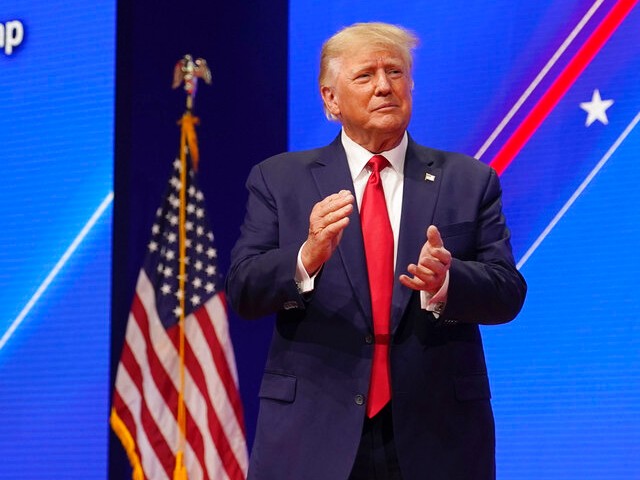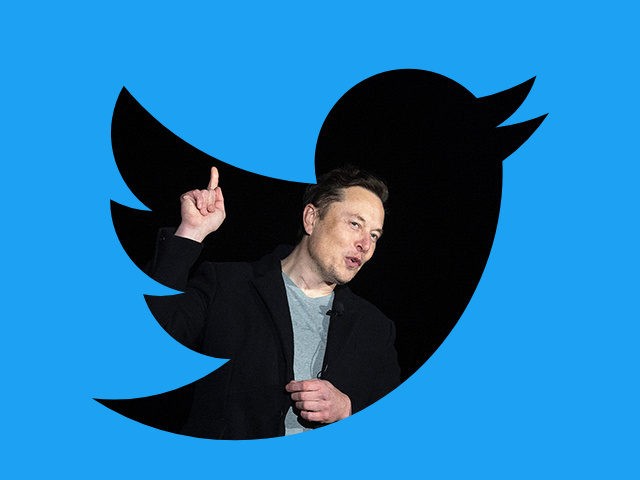After a 12-day battle, Twitter’s board of directors relented: they accepted Elon Musk’s offer to buy the company for $54.20 a share, and take it private — with the stated goal of transforming it into a global platform for free speech.
Restoring free speech on Twitter will be no easy task, even for someone with Musk’s resources. Once the deal is concluded, he will own 100 percent of the company — and yet he will lead a workforce filled with far-left, pro-censorship radicals who will be determined to thwart his agenda.
It conjures memories of Donald Trump winning the Presidency in 2016, only to find himself saddled with a bureaucracy determined to undermine his agenda at every turn.

Former President Donald Trump, speaks at the Conservative Political Action Conference (CPAC) Saturday, Feb. 26, 2022, in Orlando, Fla. (AP Photo/John Raoux)
Twitter, like the White House, will come with its own Deep State: a cadre of hostile employees who will do all they can to oppose Musk’s vision.
If Musk truly intends to bring free speech back to the platform, he will also confront a powerful pro-censorship coalition: the media, the government, Google and Apple’s app marketplaces, and hosting providers like Amazon Web Services (whose owner, Jeff Bezos, happens to have a massive feud with Musk).
To navigate this minefield, Musk will have to achieve a number of benchmarks, in the right order, without putting a foot wrong. Having covered Twitter censorship since its early beginnings in 2015, and having talked to the company’s few anti-censorship employees, I have a good idea of what those benchmarks are.
If the forthcoming list seems complicated, that’s because undoing Big Tech’s elaborate censorship regime is an extremely complicated challenge! It’s a good sign that Twitter’s soon-to-be-owner reportedly banned the phrase “it can’t be done” at Tesla.
1. Personnel is Policy
Before Musk can do anything, he must solve the personnel problem. The threat of internal sabotage from frothing-at-the-mouth progressive employees is so dire that Twitter locked down its source code within hours of announcing its deal with Musk, presumably to prevent malicious tampering. Musk simply cannot expect any part of his vision for Twitter to be enacted until he answers the personnel question.
The first and most important department for Musk to overhaul will be the office of Internal Audit. The Internal Audit department will be the eyes and ears of Musk inside Twitter, keeping tabs on every department including the C-suite, to make sure the agenda is being implemented. It took Trump three years before he found a good “internal auditor” to smoke out saboteurs in the federal government — Musk, confronted with his own Deep State, might want to get some tips from Johnny McEntee’s team.
The next most important position is that of the Chief Information Security Officer (CISO). All internal security measures at Twitter, from catching foreign spies to catching woke saboteurs, are the CISO’s responsibility. Of course, the CISO is just one person — it is more than likely that the entire internal security team will need to be replaced, and replaced with loyalists.
Other people that Musk will have to keep a close eye on, or replace, will be those in charge of the Site Reliability Engineers — the people with high-level access to Twitter’s systems, who both keep the site running smoothly, and have enough access to be effective saboteurs.
And, of course, the content moderation operation will need to be overhauled, stat.
2. Become Antifragile
As numerous conservative-run platforms have discovered, even if you mandate free speech on your platform, powers beyond your control can still censor you. Twitter is no different. It relies on access to the Apple App store, the Google Play Store, and Amazon Web Services, the cloud hosting provider that effectively banned Parler from the internet last year, and which currently has the power to do so to Twitter as well.
There are viable alternatives that are not owned by Elon-hater Jeff Bezos, such as Microsoft Azure and the Google Cloud, but they will also demand content moderation. Word on the street is that IBM’s cloud service is desperate for business, but that too will face pressure to cut service to any genuine free speech platform. Luckily, Tesla is dabbling in its own cloud infrastructure (for AI services, not hosting, but the capacity — in Tesla’s giant facilities — is clearly there), so the problem of pro-freedom cloud hosting may not be a permanent one.
As a temporary solution to the problem of App Store censorship, Musk’s Twitter could learn a trick from conservative-run competitor Parler, which separated content moderation on its browser version from content moderation on its iOS App in its successful bid to return to the App Store. Content that would have resulted in an App Store ban was blocked on the iOS app, but users could still view it through browsers. If Apple allowed it for Twitter, there is no reason it should not be the case for Musk’s Twitter.
Ultimately, a permanent solution to the problem of App Store censorship will require the owners of third-party apps, like Musk, to band together and demand regulations that prevent Apple and Google from blacklisting apps on a whim.
There is a bill going through Congress, the Open App Markets Act, which would strengthen the hand of app creators, but still contains massive loopholes allowing censorship. Musk could be a powerful force on the side of app creators against app stores. Unless Musk decides to launch a Tesla Phone to compete with Apple and Google, only regulation will break the app store chokehold.
The ultimate goal of these efforts should be to make Twitter antifragile. Whenever it is targeted by a hostile web host, app store, or payment processor, it should have the ability to quickly bounce back through alternative (perhaps Tesla-owned) providers or court injunctions backed by new anti-blacklisting laws. If Musk’s Twitter can do this, it will benefit from the hostility of third parties rather than be a victim of them, as Parler was. When highly publicized external attacks prove ineffective, it strengthens the reputation of a platform as a safe harbor for rebels — an antifragile digital fortress.
3. Conquer D.C.
A comforting myth embraced by much of Silicon Valley is that technology can solve all problems, without any regard given to government or the law. Musk, whose businesses are embedded in two areas where the government is highly active — renewable energy and space exploration — is no doubt aware that this is a myth.
If Musk truly intends to bring free speech back to Twitter, he should be prepared for a political and media onslaught. The ink was scarcely dry on Twitter’s press release when the White House warned the platform not to host “misinformation” (meaning information outside their preferred narratives). In order to secure anti-deplatforming laws that protect Twitter from hostile app stores and other third parties, he will also need to go on the offensive, backing legislation that will shield the platform from external foes. Like never before, Musk will need resourceful allies in Washington.
Another key hire for Musk will be an employment lawyer (or ten) for Twitter. California law allows businesses to fire their employees at will, but there are still plenty of grounds for unlawful termination lawsuits. Even with generous severance packages, the company’s wokest employees will be itching for an opportunity to file such lawsuits against Musk’s Twitter, even if they are frivolous. Discrimination lawsuits, frivolous or non-frivolous, are the left’s bread and butter — and Musk is already aware of how costly they can be.
4. Unravel the Algorithms
Censorship is more than just bans. It is an intricate system built up by deranged social justice warrior coders over the course of more than five years. It is shrouded in vague terminology like “coordinated inauthentic behavior,” or deceptive enforcement actions like classifying conservative accounts as “bots.” That’s before we even get to the more obvious pretexts for politically motivated banning, like “hate speech” and “disinformation.”
In order to unravel the tangled web that Twitter’s censors have weaved over the past five years, Musk’s Twitter will have to monitor the effects of its algorithms from the inside and out. Like so many other things, this is a personnel challenge — Musk will need people who are competent in data analysis, who understand what to look for, what data they need to access, and how to analyze what they see. He will probably need covert, outside observers of Twitter’s bias as well as employees on the inside tasked with correcting it. The benefit of covert observers is that hostile actors within Twitter will not know they are watching, nor how to prevent them from doing so.
Another important purpose of unraveling the algorithms is being able to know how “shadow banning,” a platform Twitter has long engaged in while pretending not to, actually works. Musk should also strongly consider revealing this to the public. It is an enormous scandal that social media platforms have picked winners and losers in the media and in national debates for so long, with zero transparency. Twitter users around the world want to know how this insidious method of censorship works, who was affected by it, and who benefited from it.
5. Embrace Self-Sovereign Identity
One Musk promise that turned heads was the SpaceX and Tesla founder’s pledge to “authenticate real humans.” While he did not go into detail about what he meant, it alarmed some people who value internet anonymity, perhaps the best refuge for political dissidents in modern times. What did Musk mean by this? If the goal is to make users provide more personal identifying information to Twitter, it could be a big problem for dissidents.
Luckily, on the outer edge of innovation, a new technology has developed that would allow platforms to “authenticate real humans” while also protecting privacy and anonymity: it’s called Self Sovereign Identity. It works by separating the business of identity verification from centralized actors. Instead of verifying your identity to Google, or to Facebook, or to Twitter, you verify your identity to a third party whose sole purpose is providing secure, privacy-protecting verification. Once this is done, you are given a digital passport proving you are a human (but not necessarily revealing any other personal data) that can be used by platforms like Twitter to ensure new users are not bots.
If Musk embraces this technology, he can kill multiple birds with a single stone: he will solve the problem of authenticating humans, while making Twitter more privacy-friendly than any of its competitors, while at the same time mainstreaming a technology that has enormous potential: for platforms, for users, and for the future of secure online conversations.
6. The Great Unbanning
The most obvious point is saved for last, yet unbanning people, like every other step on the road to restoring free speech on Twitter, will be no straightforward task. While the more prominent victims of Twitter censorship, like Donald Trump, will be easy to identify, there are thousands upon thousands of smaller accounts that have been banned for bogus reasons and will also need to be restored. As I explained in my book on tech censorship, DELETED, leftist-run platforms like Twitter spent the last half-decade developing tools to target not just individual users, but entire networks of users. How will those users be identified? Will there be a general amnesty? If there is a general amnesty, how will the flood of unbanned spambots, phishers, sharers of illegal material, and other genuinely unwelcome accounts be dealt with?
Answering these challenges, like every other obstacle I’ve listed here, all depends on the first item on the list: personnel. The team that restores free speech on Twitter will need to be loyal, talented, resourceful, and determined. It should also include people who worked at Twitter, or still work there, but oppose censorship. Those people, all of whom are naturally in hiding, can be devilishly difficult to find. Luckily, they do exist.
Allum Bokhari is the senior technology correspondent at Breitbart News. He is the author of #DELETED: Big Tech’s Battle to Erase the Trump Movement and Steal The Election.


COMMENTS
Please let us know if you're having issues with commenting.